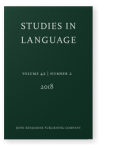Existentials and possessives in Modern Hebrew
Variation and change
This paper considers the relationship between synchronic variation and language change in the context of the existential and possessive constructions in Modern Hebrew, which exhibit a normative – colloquial alternation. The study examines usage patterns across age groups and time periods, as represented in spoken-language corpora. It shows that the non-normative construction is used extensively in the contemporary speech of adults. Moreover, a comparison of the use of the normative – colloquial alternations by two populations, children and adults, in different time periods, provides evidence to suggest that these constructions are undergoing language change. A cross-linguistic perspective lends additional support: across languages the expression of existence involves non-canonical structures, which are particularly susceptible to language variation and, possibly, language change.
Article outline
- 1.Overview
- 2.Language change in Modern Hebrew
- 3.Existence and possession in Modern Hebrew
- 3.1Background
- 3.2Subject-verb agreement: Deviations from norms
- 4.The study
- 4.1Overview
- 4.2The corpora
- 4.3Methodology
- 4.4The existentials and possessives in contemporary adult speech
- 4.4.1Findings
- 4.4.2Usage patterns
- 4.4.3Summary
- 4.5The existentials and possessives from a diachronic perspective
- 4.5.1Introduction
- 4.5.2Corpus data
- 4.5.3Adult speech across time
- 4.5.4Variability in children’s speech
- 5.Discussion
- 5.1Non-canonicity, variability and instability
- 5.2The subject properties of the existential pivot
- 5.3The possessive construction and subject properties
- 6.Conclusions
- Acknowledgements
- Notes
-
References
References
Ariel, M.
1990 Accessing Noun-Phrase Antecedents. London: Routledge.

Baroni, M., S. Bernardini, A. Ferraresi & E. Zanchetta
2009 The WaCky wide web: A collection of very large linguistically processed web-crawled corpora.
Language Resources and Evaluation 431. 209–226.


Beaver, D., I. Francez & D. Levinson
2005 Bad subject: (Non-) canonicality and NP distribution in existentials. In
E. Georgala &
J. Howell (eds.),
Proceedings of Semantics and Linguistic Theory 151, 19–43. Ithaca, NY: Cornell University.

Berman, R. A.
1980 The case of an (S)VO language: Subjectless constructions in Modern Hebrew.
Language 56(4). 759–776.


Berman, R. A.
1992 Child language and language change. In
U. Ornan,
R. Ben-Shahar &
G. Touri (eds.),
Ha-ivrit safa xaya [
Hebrew: A Living Language], 9–22. Haifa: Haifa University Publications.

Borochovsky Bar-Aba, E.
2010 Issues in the Study of Colloquial Hebrew, Its Syntax and Expression. Jerusalem: The Bialik Institute. [in Hebrew].

Claes, J.
2014 A Cognitive Construction Grammar approach to the pluralization of presentational haber in Puerto Rican Spanish.
Language Variation and Change 26(2). 219–246.


Doron, Edit
(ed.) 2015 Language Contact and the Development of Modern Hebrew. Leiden: Brill.


Givón, T.
1976 On the VS order in Israeli Hebrew: Pragmatics and typological change. In
P. Cole (ed.),
Studies in Modern Hebrew Syntax and Semantics, (
North Holland Linguistic Series 32), 153–181. Amsterdam: North-Holland.

Harshav, Benjamin
1993 Language in Time of Revolution. Berkeley: University of California Press.


Heine, B.
1997 Possession: Cognitive sources, forces, and grammaticalization, vol. 831. Cambridge: Cambridge University Press.


Itai, A. & S. Wintner
2008 Language resources for Hebrew.
Language Resources and Evaluation 42(1). 75–98.


Jespersen, O.
1924 The Philosophy of Grammar. Reprint Norton Library 1965.

Jespersen, O.
1954 A Modern English Grammar: On Historical Principles, vol. 21. London: George Allen & Unwin Ltd.

Keenan, E. L.
1976 Towards a universal definition of “subject”. In
C. N. Li (ed.),
Subject and Topic, 303–333. New York: Academic Press, Inc.

Kuzar, Ron
2002 The simple impersonal construction in texts represented as colloquial Hebrew. In
S. Izre’el (ed.),
Medabrim ivrit [
Speaking Hebrew], 329–352. Tel Aviv: Tel Aviv University.

Labov, W.
1981 What can be learned about change in progress from synchronic description? In
D. Sankoff &
H. Cedergren (eds.),
Variation Omnibus, 177–199. Edmonton: Linguistic Research.

Lambrecht, K.
1994 Information Structure and Sentence Form: Topic, Focus and the Mental Representations of Discourse Referents (
Cambridge Studies in Linguistics 17). Cambridge: Cambridge University Press.


MacWhinney, B.
2000 The CHILDES project: Tools for analyzing talk. Third Edition. Mahwah, NJ: Lawrence Erlbaum Associates.

Maschler, Y.
2014 The Haifa Corpus of Spoken Israeli Hebrew.
[URL].
McAnallen, J.
2011 The History of Predicative Possession in Slavic: Internal Development vs. Language Contact. Berkeley: University of California, Berkeley Doctoral dissertation.

McNally, L.
2016 Existential sentences crosslinguistically: Variations in form and meaning.
Annual Review of Linguistics 21. 211–231.


Melnik, N.
2002 Verb-Initial Constructions in Modern Hebrew. Berkeley: University of California, Berkeley Doctoral dissertation.

Melnik, N.
2006 A constructional approach to verb-initial constructions in Modern Hebrew.
Cognitive Linguistics 17(2). 153–198.


Melnik, N.
2014 Language change in spoken Hebrew: Existence and possession.
Hebrew Linguistics: A Journal for Hebrew Descriptive, Computational and Applied Linguistics 681:67–82. [in Hebrew].

Partee, B. H. & V. Borschev
2007 Existential sentences, BE, and the genitive of negation in Russian. In
I. Comorovski &
K. von Heusinger (eds.),
Existence: Semantics and Syntax, 147–190. Dordrecht, Netherlands: Springer.

Ravid, D.
1995 Language Change in Child and Adult Hebrew: A Psycholinguistic Perspective. New York: Oxford University Press.

Reshef, Yael
2008 On the history of attestation of the possessive construction "yesh lo et" in the early days of Spoken Hebrew.
Leshonenu La’am 561. 226–233. [in Hebrew].

Reshef, Yael
2015 Hebrew in the Mandate Period. Jerusalem: The Academy of the Hebrew Language. [in Hebrew].

Sasse, H. -J.
1987 The thetic/categorical distinction revisited.
Linguistics 251. 511–580.


Schmerling, S.
1976 Aspects of English Sentence Stress. Austin: University of Texas Press.

Ziv, Y.
1976 On the reanalysis of grammatical terms in Hebrew possessive constructions. In
P. Cole (ed.),
Studies in Modern Hebrew Syntax and Semantics (
North Holland Linguistic Series 32), 129–152. Amsterdam: North-Holland.

Cited by
Cited by 1 other publications
Izre'el, Shlomo
2022.
The syntax of existential constructions.
Journal of Speech Sciences 11
► pp. e022001 ff.

This list is based on CrossRef data as of 14 april 2024. Please note that it may not be complete. Sources presented here have been supplied by the respective publishers.
Any errors therein should be reported to them.
